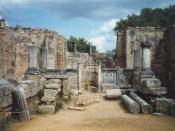These are the things that normally come to mind when people of this century try to name the Seven Wonders of the World: Stonehenge, the Great Wall of China, the statues on Easter Island, and the Great Pyramids at Giza, to name a few. While they are all remarkable and equally mysterious, only one of the above is actually on the original list of the Seven Wonders of the Ancient World and it is the Great Pyramids at Giza. Although the list is famous and most people have heard of it, not that many can actually name all seven because of the seven, only the Pyramids remain virtually undisturbed. The other six are: the temple of Artemis at Ephesus, the Hanging Gardens of Babylon, the Mausoleum at Halicarnassus, the Colossus at Rhodes, the statue of Zeus at Olympia, and the Pharos at Alexandria. Philo of Byzantium compiled the list we commonly use today c.
225 BC in Alexandria, Egypt in his On the Seven Wonders. While most of the wonders were considered to be of Greek origin, the statue of Zeus at Olympia stands out merely because it epitomized the core of Greek life: worshipping the gods. While many of the Ancient Wonders were decidedly Greek in origin and nature, the statue of Zeus at Olympia stands out as being a true Greek wonder.
The city of Olympia was a place of worship and only those of Greek blood could worship within its walls. When the Olympic Games were held in ancient days, the same standard applied to the athletes wanting to participate. While the whole world knows of the Olympic Games today, not too many know that the statue of the god of which the games are supposed to honor was also a wonder of the...


